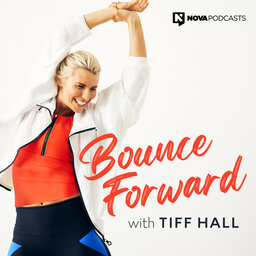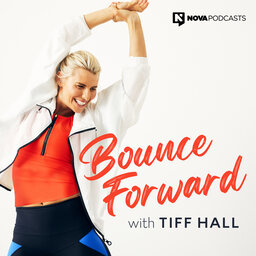Dietitian Leanne Ward's Fat Loss Formula
Bounce Forward
We always hear we need to bounce back...We think you should ‘Bounce Forward!’ Join Fitness Guru and Mother of two Tiff Hall as she takes you through…Leanne Ward has a wealth of experience with nutrition and food and now she's developed a fat loss formula unlike your regular diets!
This one is based around reset, nourish and burn and she chats to Tiff all about it in todays ep.
Plus she shares how to develop a healthy eating routine packed with veggies and whether dairy milk is actually bad for you.
LINKS
- Follow Tiff Hall on Instagram @tiffhall_xo, Youtube, and Facebook
- Follow Leanne Ward on Instagram @the_fitness_dietitian
- Email Tiff at bounceforward@novaentertainment.com.au
- Find out more about Tiff Hall and TXO https://mytxo.com/
- Follow Nova Podcasts on Instagram for videos from the podcast and behind the scenes content – @novapodcastsofficial.
CREDITS
Host: Tiff Hall
Guest: Leanne Ward
Executive Producer: Rachael Hart
Editor: Adrian Walton
Managing Producer: Ricardo Bardon
Find more great podcasts like this at novapodcasts.com.au
Nova Entertainment acknowledges the traditional custodians of the land on which we produced this podcast, the Wurundjeri people of the Kulin Nation. We pay our respect to Elders past and present.
In 1 playlist(s)
Bounce Forward
We always hear we need to bounce back...We think you should ‘Bounce Forward!’ Join Fitness Guru an…Social links
Follow podcast
Recent clips

We're Taking a Break, But We'll Be Back
06:17

Rachel Corbett Was on a Sure Path to Post-Natal Depression
13:04

Rachel Corbett's Solo Birth Story
17:32
 Bounce Forward
Bounce Forward